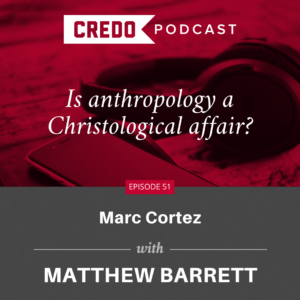Show Notes
What is the best starting point for developing a theology of humanity? Should we begin with the secular sciences? What about the creation narrative, especially when that biblical narrative points to Christ, the image of the invisible God? If he is the Second Adam and true and perfect humanity, might we begin with him? In this episode of the Credo Podcast, Matthew Barrett interviews Mark Cortez on the topic of Christological anthropology and together they explore 11 theses.

Marc Cortez (PhD, University of St. Andrews) is professor of theology at Wheaton College in Wheaton, IL, where he has been teaching since 2013. He is a leading scholar in the area of theological anthropology, and has authored several books on the topic, including: Theological Anthropology: A Guide for the Perplexed; Embodied Souls and Ensouled Bodies: An Exercise in Christological Anthropology and Its Significance for the Mind/Body Debate; Christological Anthropology: Ancient and Contemporary Approaches to Theological Anthropology; and ReSourcing Theological Anthropology: A Constructive Account of Humanity in Light of Christ.
Matthew Barrett is Associate Professor of Christian Theology at Midwestern Baptist Theological Seminary, as well as the founder and executive editor of Credo Magazine. He is the author of several books, including Canon, Covenant and Christology: Rethinking Jesus and the Scriptures of Israel; None Greater: The Undomesticated Attributes of God; 40 Questions About Salvation; God’s Word Alone: The Authority of Scripture; Reformation Theology: A Systematic Summary; Salvation by Grace, and Owen on the Christian Life. He is the host of the Credo podcast where he engages top theologians on the most important theological issues today.
